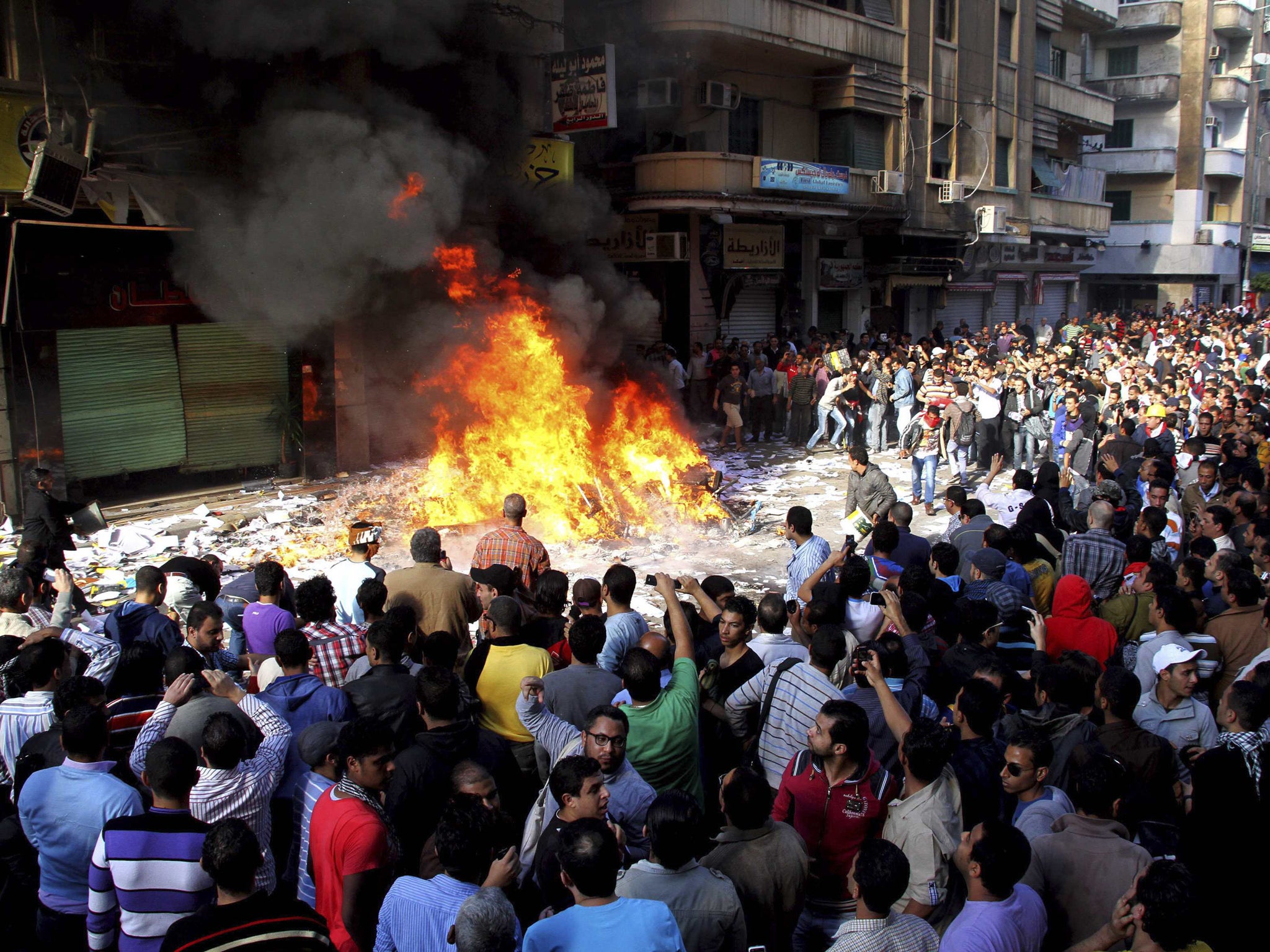The 'new pharaoh' plunges Egypt back into turmoil
Violent protests sweep the country after the Islamist President grants himself far-reaching powers

Violence broke out across Egypt last night as protesters reacted to the power grab by Mohamed Morsi. His party's offices were torched, while his opponents called the President a "dictator" and "pharaoh" who has now acquired more political might than the ousted leader, Hosni Mubarak.
There was fierce fighting in Alexandria following afternoon prayers, as thousands of opposing protesters hurled rocks and broken masonry at each other outside a mosque.
State television reported that mobs in a number of cities had set fire to the offices of the Freedom and Justice Party, the political wing of Mr Morsi's Muslim Brotherhood.
The group's headquarters in Suez, Port Said and Ismailia were all said to have been targets.
In Cairo, police fired tear gas at protesters after several thousand people joined an anti-Morsi demonstration in Tahrir Square.
Youths had been involved in clashes with police in Mohamed Mahmoud Street – scene of deadly riots a year ago – since Monday. But as enormous crowds filed into Tahrir Square, the violence appeared to be escalating.
Mohamed ElBaradei, the one-time presidential candidate who had previously negotiated a political truce with Mr Morsi, claimed that the President had appointed himself the "new pharaoh" following the constitutional declaration he issued on Wednesday.
"Morsi today usurped all state powers," he wrote on Twitter shortly after the Egyptian leader's surprise statement.
Mr ElBaradei added that the move was a "major blow" which could have "dire consequences".
Worrying political battle lines were developing in Cairo as huge groups of rival protesters staged separate rallies yesterday. Outside the Presidential Palace in the eastern Heliopolis district, thousands of Muslim Brotherhood members arrived to celebrate Mr Morsi's announcement – a move which grants him immunity from judicial oversight along with vague new powers to protect the "goals of the revolution".
Giving a speech to his supporters, Mr Morsi said the declaration had been made to safeguard the future of the nation. "We are, God willing, moving forward, and no one stands in our way," he said.
"Victory does not come without a clear plan and this is what I have."
In his decree, Mr Morsi also vowed to re-examine criminal cases against officials accused of killing protesters during the Egyptian uprising – an apparent sop to activists who remain outraged that so few police officers have been brought to justice over the past two years.
Yet as bewilderment turned to anger last night, several thousand protesters marched on Tahrir Square in scenes reminiscent of the January 2011 protests that eventually toppled President Mubarak.
Amid a sea of flags hoisted by Egypt's disparate secular and liberal opposition groups, opponents of the Muslim Brotherhood descended on Downtown Cairo chanting for "bread, freedom and the downfall of the murshid" – the Brotherhood's Supreme Guide.
"The Muslim Brotherhood wants the country to become like Iran," said Magda Maamoun, a 30-year-old IT worker, as she marched through the western Dokki district on her way to central Cairo. "It is a dictatorship under the name of religion."
In addition to the judicial immunity which Mr Morsi has granted himself, the declaration also prevents any court from disbanding Egypt's constituent assembly, an Islamist-dominated body tasked with drafting a new constitution.
The assembly has been working under the threat of dissolution due to a number of court cases examining its legitimacy.
It has also been crippled as a result of successive walkouts by secular and Christian members, many of whom object to the draft constitution's perceived Islamic bias and clauses regarding women's rights and sharia law.
Brotherhood officials have argued that Mr Morsi's decree was necessary to ensure Egypt's revolution does not grind to a halt as a result of fractious political infighting and sabotage by elements from the old regime.
It is a view which may find currency among some Egyptians, many of whom are more concerned about the price of bread and fuel than the minutiae of constitutional politics. Writing on Twitter, a Muslim Brotherhood spokesman said that the President's decisions are "all directed towards achieving justice, ending corruption and fulfilling the goals of the #Jan25 revolution".
Yet critics say that Mr Morsi's arbitrary declaration may prove dangerously counter-productive.
"He now has more power than Hosni Mubarak," said Koert Debeuf, a representative of the EU Parliament based in Cairo. "The way to democracy cannot pass through dictatorship.
"There has been a danger of political chaos in Egypt. So in a certain way maybe he was trying to avoid that by issuing the declaration. But by doing so he has created even more chaos."
Subscribe to Independent Premium to bookmark this article
Want to bookmark your favourite articles and stories to read or reference later? Start your Independent Premium subscription today.

Join our commenting forum
Join thought-provoking conversations, follow other Independent readers and see their replies